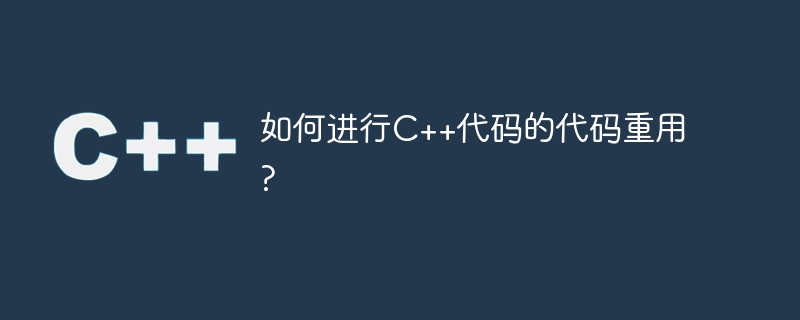Home >Backend Development >C++ >How to reuse C++ code?
How to reuse C++ code?
- PHPzOriginal
- 2023-11-03 17:39:131397browse

How to reuse C code?
Code reuse is a very important concept in software development, it can improve the maintainability and scalability of the code and repeatability. C, as a powerful programming language, provides many ways to achieve code reuse. This article will introduce some common C code reuse techniques and practices.
1. Function reuse
Function is the basic unit of C code reuse. By writing reusable functions, commonly used functions can be encapsulated and easily called in different places. During the function design process, the functions of the function should be designed to be as versatile as possible to meet different usage scenarios. In C, you can use function templates to achieve general function reuse.
Taking calculating the maximum value of two numbers as an example, you can write a general function template:
template<typename T>
T max(T a, T b) {
return a > b ? a : b;
}This function template can be used for different types of data, such as integers and floating point types. wait. In actual use, you only need to pass the corresponding parameter type as needed.
2. Class reuse
Class is another commonly used unit of code reuse in C. By defining classes and class member functions, related data and operations can be encapsulated together to form an independent module. Other modules can use these functions by instantiating the object. When designing a class, you should consider how the class is used and possible changing requirements, and write classes that are as versatile and flexible as possible.
For example, to implement the function of a stack, you can design a class named Stack:
template<typename T>
class Stack {
vector<T> data;
public:
void push(const T& value) {
data.push_back(value);
}
T pop() {
T value = data.back();
data.pop_back();
return value;
}
bool empty() const {
return data.empty();
}
};This Stack class can be used for different types of data, just set the corresponding data type as Template parameters are enough.
3. Library reuse
A library is a collection of related functions that can be used as a code reuse unit for an entire project or across multiple projects. C provides a rich standard library and third-party libraries, and you can directly use the functions and classes provided in these libraries to achieve code reuse.
For example, for string operations, you can use the string class and related functions provided by the
4. Inheritance and polymorphism
Inheritance and polymorphism are two important concepts in object-oriented programming and are also powerful tools for C code reuse. Through inheritance, new classes can be derived from existing classes, inherit their properties and operations, and add new functions on this basis.
When designing a class, you can use inheritance to place common functions in the base class, and then add specific functions to the derived class. This enables code reuse and improves code maintainability and scalability.
At the same time, polymorphism can be achieved by using virtual functions and pointers or references. At runtime, the corresponding function is called according to the actual type of the object to improve the flexibility of the program.
5. Modular design
Modular design is a method of dividing functions into independent modules and minimizing dependencies between modules. Modular design facilitates code reuse because reusable functions can be encapsulated in independent modules and other modules can directly call these functions.
In C, modular design can be achieved by encapsulating functions in different header files and source files. Modules communicate by including header files and link libraries.
Summary:
The reuse of C code is an important means to improve software development efficiency and code quality. Through the rational design and use of functions, classes, libraries, inheritance and polymorphism, and modular design and other technologies, a high degree of code reuse can be achieved. In actual development, these technologies should be fully utilized to improve code quality and maintainability, avoid duplication of work, and improve development efficiency.
The above is the detailed content of How to reuse C++ code?. For more information, please follow other related articles on the PHP Chinese website!
Related articles
See more- C++ compilation error: A header file is referenced multiple times, how to solve it?
- C++ compilation error: wrong function parameters, how to fix it?
- C++ error: The constructor must be declared in the public area, how to deal with it?
- Process management and thread synchronization in C++
- How to deal with data splitting problems in C++ development

